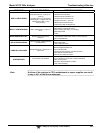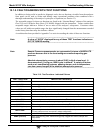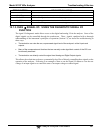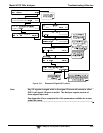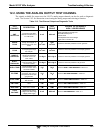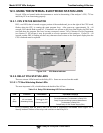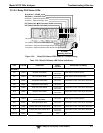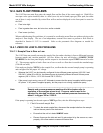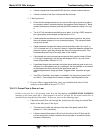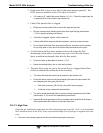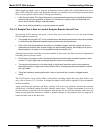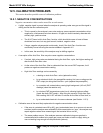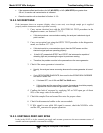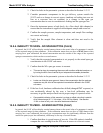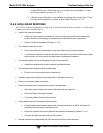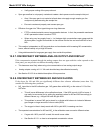
Model 9110T NOx Analyzer Troubleshooting & Service
Teledyne Analytical Instruments 273
If there is proper flow of around 450-550 cm³/min, contact customer service.
If there is no flow or low flow, continue with the next step.
2. Check pressures.
Check that the sample pressure is at or around 28 in-Hg-A at sea level (adjust
as necessary when in elevated location, the pressure should be about 1” below
ambient atmospheric pressure) and that the RCEL pressure is below 10 in-Hg-
A.
The 9110T will calculate a sample flow up to about 14 in-Hg-A RCEL pressure
but a good pump should always provide less than 10 in.
If both pressures are the same and around atmospheric pressure, the pump
does not operate properly or is not connected properly. The instrument does
not get any vacuum.
If both pressures are about the same and low (probably under 10 in-Hg-A, or
~20” on sample and 15” on vacuum), there is a cross-leak between sample flow
path and vacuum, most likely through the Perma Pure dryer flow paths. See
troubleshooting the Perma Pure dryer later in this chapter.
If the sample and vacuum pressures are around their nominal values (28 and
<10 in-Hg-A, respectively) and the flow still displays XXXX, carry out a leak
check as described in Section 13.3.12.
If gas flows through the instrument during the above tests but goes to zero or is
low when it is connected to zero air or span gas, the flow problem is not internal
to the analyzer but likely caused by the gas source such as
calibrators/generators, empty gas tanks, clogged valves, regulators and gas
lines.
If an IZS or Zero/Span valve option is installed in the instrument, press CALZ
and CALS. If the sample flow increases, suspect a bad Sample/Cal valve.
3. If none of these suggestions help, carry out a detailed leak check of the
analyzer as described in Section 11.3.12.2.
12.4.1.2. Ozone Flow is Zero or Low
If there is zero or a low (<50 cm³/min) ozone flow, the unit displays an OZONE FLOW WARNING
message on the front panel and a value between 0.0 and 50 cm³/min for the actual ozone flow as
measured by the internal mass flow meter. In this case, carry out the following steps:
1. Check the actual flow rate through the ozone dryer by using an external flow
meter to the inlet port of the dryer.
This inlet port is inside the analyzer at the end of the plastic particle filter
(Section 11.3.2 for illustration).
If there is nominal flow (about 160 cm³/min from 80 cm³/min O3 flow and 80
cm³/min purge flow), consult customer service as there is a problem with the
firmware or electronics.



